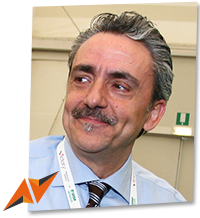Up close with the experts: Interview with Vincenzo Manco, UISP President
 In our exclusive interview, UISP President Vincenzo Manco talks about the vital role of physical activity in shaping sustainability, social rights and spatial development in cities. And find out why the MOVE Congress is such an important tool for physical activity promotion in Italy and further abroad.
In our exclusive interview, UISP President Vincenzo Manco talks about the vital role of physical activity in shaping sustainability, social rights and spatial development in cities. And find out why the MOVE Congress is such an important tool for physical activity promotion in Italy and further abroad.
Q. What are your expectations for the MOVE Congress 2014 in Rome?
A. Sport and physical activity struggle to affirm themselves in Italy as real educational, social and health instruments. The biggest proportion of resources is allocated to elite sports and sport federations. In our country sport is not defined “by law” and it is very difficult to build public policies around it and plan the objectives we want to reach.
The organisational model and connected representation mechanisms of the Italian sport system show a lack of balance, which has a negative influence on the promotion and diffusion of physical activity. That’s why the MOVE Congress is a meaningful opportunity to exchange good practices among European cultures and a chance for Italian institutions and sport associations to meet and discuss how to improve sport initiatives in our country.
Q. When you started as Vice President of UISP in 2009 you said that three of the main challenges you would like to address are environmental sustainability, social rights and spatial development. How do you see the role of physical activity in relation to these challenges?
A. What is happening in the economic and social fields is that all public bodies and stakeholders are being asked to give answers to the need for sport and physical activity in order to improve the wellness of their communities. To think about urban development means to consider engaging in a strong interaction with sustainability matters. Citizens need conditions and services that guarantee, and eventually extend, their system of social rights and the active usability of their own towns.
Sustainability is, overall, about our own bodies and how they move inside urban spaces. It requires the requalification and regeneration of sport facilities; it embraces – especially nowadays – the need for sociality, health and quality of life. From here, it becomes increasingly important to develop towns and cities into more active spaces. Physical activity is an expression of the citizen’s need to feel a sense of wellness, so it interlaces the system of citizenship rights and assumes value of universality in social relations. In Italy the limits of certification of facilities have to be simplified to promote facilities close to people which are well-equipped and safe.
Q. From an EU policy perspective, the latest Eurobarometer report confirms the importance of supporting member states in promoting sport and physical activity and clearly shows the need to pursue efforts at all levels for a healthier Europe. How does UISP see the future of physical activity and health in Europe?
A. Eurobarometer confirms the frame of differences among European countries, referring to respective welfare systems and investments in the field of social rights. Italy is at the bottom of the table in terms of percentage of sedentary citizens. This fact confirms the need to invert the trend through a strategy of integrated politics giving centrality to the importance of physical activity.
From the Charter of Fundamental Rights of the European Union, signed in Nice, to the Treaty of Lisbon, great steps forward have been made in recognition of the social and integration values of sport. The White Paper on sport, as well as the Erasmus+ programme, linked to Structural Funds 2014/2020, are a clear sign of the direction the European Union wants to take in terms of physical activity and citizens’ wellness. Social reorganisation and the economic crisis have to prompt the states to increase their protection of citizens and their rights, not to restrict them. Sport and physical activity has to be included in these rights: it is a way to save money and to invest in social infrastructure, as well as to improve European citizens’ quality of life.
Q. Grassroots sport organisations and NGOs are addressing a systemic change in Europeans’ behaviour. What types of partners do you think are important for us to work with in our mission to promote physical activity?
A. The demand for sport and physical activity initiatives is in continuous evolution. The need for wellness among citizens has modified their behaviour, and various sport disciplines have mixed with each other. Grassroots sport organisations have understood and interpreted this need to proposing new ideas about sport, which are focused on health and sociality rather than performance or the achievement of a result. I believe the winning action to obtain significant results in lifestyle change is to engage in increasing synergies among social nets, citizens’ associations and European institutions. In this sense ISCA is a virtuous example of sport politics born from the grassroots level. Encouraging open debate and exchanging good practices, combined with fostering relationships between institutions will help us achieve our shared objectives. In the future we will need to individualise campaigns, such as the MOVE Week, and projects allowing us to gather public opinion on the results in order to show how our intervention contributed to improving the quality of life of our citizens.
